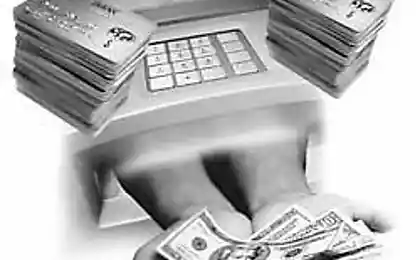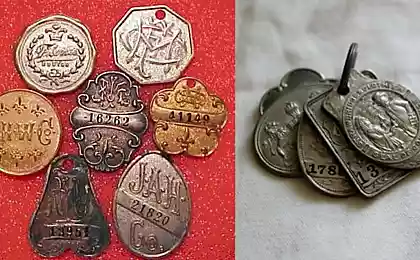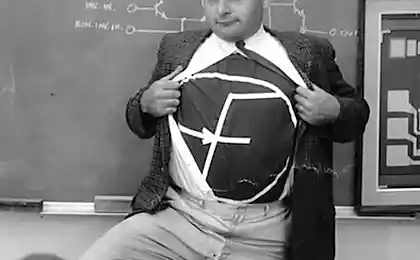989
10 most common fraud schemes
1. "The Fallen melon»
Every decent person, through the fault of someone else who broke an expensive thing, it will offer the owner to repair the damage. Such honesty is often used by fraudsters who can tune such as "random" encounter on the street or in a store.
Such scams are very common in the land of the rising sun during the crazy high prices of fruit and, in particular - melons. Attackers with melons in his hands deliberately crashed into tourist and dropped his burden, demanded compensation. As a general rule, travelers prefer to pay to quickly hush up the conflict.
Of course, by "falling melon" speculators are in our time, but instead they drop their fruit household appliances (which most likely was broken long before the fall) or the box with "doroguschy vases" (ie broken glass), they said , "bought as a gift to his wife" (as an option - the mother-in). The most careful and experienced from scam even acquire fake checks that placing in evidence the value of "spoiled things».

2. "godsend»
You may have encountered a similar scam, if not your imagination: you on the street asked a complete stranger, who claims to have found a wallet with a large sum of money and does not know how to handle them. During discussion of the situation your partner or you voiced the idea that the funds should be divided. The scammer calls his "lawyer" who "advises" you to take money on deposit, prepositions can be different, "better to wait, do not show up if the owner of the purse," or something like that. Rogues ask you to leave them a smaller amount as a guarantee for the future receipt of the findings, you amenable to persuasion, since even imagine how much you can buy in the "fallen from the sky" state. Further developments is not difficult to predict - looking into the wallet, you find there "jokes tickets bank" or a pack printed on the printer, "notes».
There are different variations of this scam, but somehow, the attackers "a large amount of trust," or "valuable thing" only in exchange for a pledge. Be careful - if a stranger agrees to give you a lot of money at much lower collateral, it is either an idiot or a follower of the great schemer.
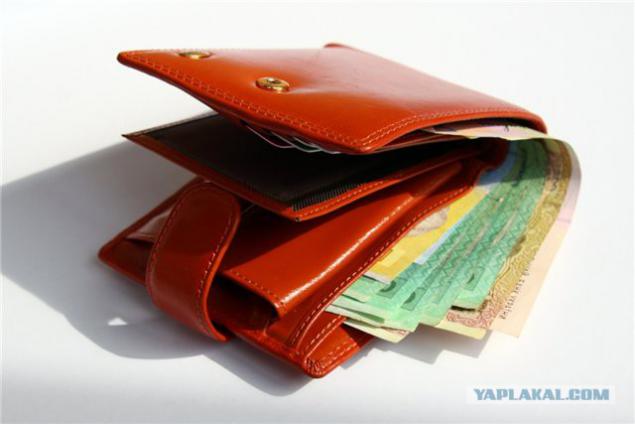
3. "The Ring»
As a "gift of fate", this kind of scam is designed for an extremely greedy and pragmatic, or vice versa, unselfish and helpful people. Most often fraudsters operate as follows: on the street you meet a charming girl heartbroken that asks whether you are her golden wedding ring, lost somewhere nearby. After receiving a negative response, the beautiful promises a reward for the return of jewels and leave contact phone number to ring in case of you can contact her. After a while you "miraculously" encounter with a stranger who "just today" found a gold ring, "standing fabulous money" and of course, the finding was made precisely in the area where you applied "distraught bride».
Fool clear that the ring belongs to her and you decide to buy the ring to pass his "victim", leave yourself or to sell (the latter two options - for the most stale and heartless). To pay for a jewel tidy sum, you carry it to a jeweler and ask to assess a "good buy", and he said that this piece of copper is slightly less than nothing.
If you do not want to fall into such a binding, try to stay away from strangers, but eager rubbed your help, even if it is very nice, and in any case do not buy from passers jewelry and other things that look very valuable.
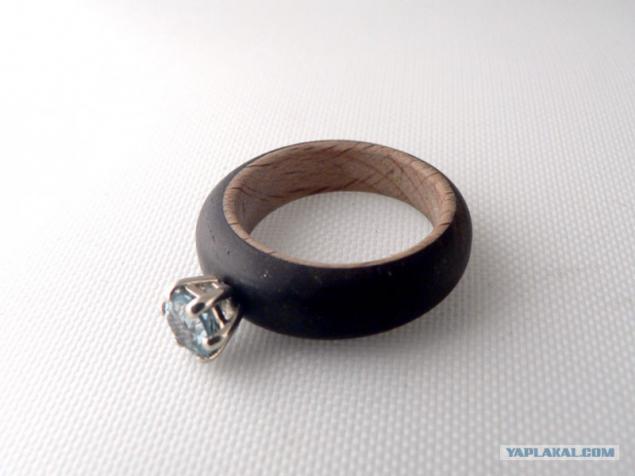
4. "Winning the lottery»
There is a huge number of varieties of this fraud, but the principle remains the same it - convince the victim to buy up "prize" at the dummy "lottery winners" who for some reason can not get the prize. When mobile phones were not common enough, fraudsters even produced false papers to "prove win" tables Ticket winners, but now the victim may at any time check the true price of a ticket, so the newspaper is no longer printed crooks, learning other ways to convince the client to part with money .
Sometimes the "winner" claims, for example, owes the bank a large sum of money, so certainly bailiffs confiscated his winnings. In other cases, the problem is the absence of registration or identity document - imagination is boundless intruders. "Luohu" offer to become the owner of the coveted tickets for the modest (compared to the "Prize") money, and when he comes for the "legitimate reward," I was surprised to realize that he gave for their money.
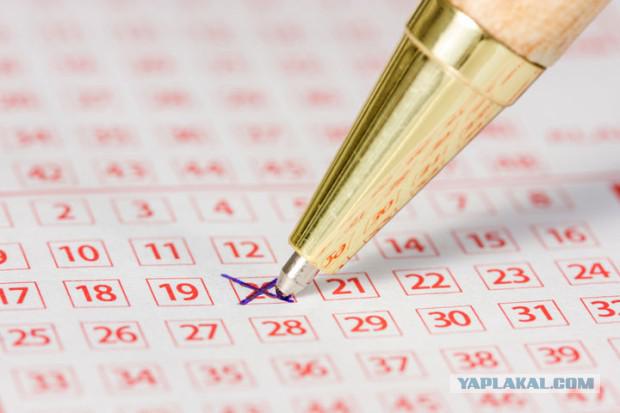
5. "The Spanish Prisoner»
"The Spanish Prisoner" - one of the oldest tricks fraudsters (similar to the case described in one of the books XVI-century, in honor of his trick it got its exotic name), but the narrow-minded and gullible townsfolk still come across it. The thing is - the scammer convinces "sucker" that he is a very senior and influential person (perhaps from another country) to be quietly get owned him money. From the victim requires a feasible material aid, instead of "American businessman" ("Arab Sheikh", "Nigerian prince" - a legend can be anything) promises considerable rewards and assures that any services will, of course, only after receiving the money. During the "rescue capital" having more and more difficulties that can be overcome only by infusion of additional funds from the victim's pocket -vymogatelstvo lasts as long as the client does not run out of money, or he did not suspect the deception.
Con artists of our time are often cautious and ingenuity of their colleagues, who lived centuries earlier. For example, a crook posing as assistant foreign diplomat or an industrialist, tells you what he wants to buy the extremely valuable goods lying in stock, but the entire amount is not on hand. You offer to invest their money, because the deal is very beneficial - the money spent will return tenfold. Then it turns out that to get the goods are not so simple - it is necessary to "give to the paw" officer or other officer so kindly to fork out again, and so on ... Do not hesitate to pay, because "profit with a vengeance cover all costs" - a joke Of course. These movers and shakers of the business will never be involved in major transactions outsiders, do not let the desire for freebies to take precedence over common sense.

6. "To you goes Auditor!»
You, as any reasonable person not going to anybody to report information on their bank accounts, however, fraudsters can fraudulently obtain access to your cash.
The most common scam crank their machinations via accomplice working at the bank. For example, you are told that the account is frozen for "verification details", because of "suspicion of his fictitious" or for any other reason (most importantly, that she was more convincing as possible), and while you're trying to figure out what's what, fraudsters deposit money into your account and cover their tracks illegal operations. Crooks use a very different circuit, so if you thought that a bank employee fool you, immediately ask for a meeting with his boss - it will help to clarify the situation, of course, if the top managers in the share.

7. "Overpayment»
For cheaters shortcomings of the banking system and "hole" in the legislation - that still loyal associates. Rogues have long used such tricks as the opening of fictitious accounts and fake bank checks, among the most popular types of such scams - writing a check for an amount exceeding the purchase price. When the seller discovers "overpayment" and tells of her attacker, who proposes to transfer the "extra money" to another account, or send cash to the specified address. When you try to cash a check unlucky victim discovers that account is closed or never existed.
One of the most famous artists in the world of banking fraud - American Frank Abagnale Jr. In the 1960s Frank cranked lot of illegal transactions worth more than $ 2, 5 million. His outstanding acting skills helped him for a long time hiding from the police, but in the end, Abagnale was caught and sentenced to 12 years in prison. He spent only a fraction of the period, and after his release from prison became a consultant to major corporations and governments around the world on issues of economic security. In 2002, he released the movie "Catch Me If You Can," which is based Abagnale's autobiography.

8. "Plumbing called?»
Speculators often disguised as employees of public utilities and government organizations, allowing you to quickly ingratiate himself to a potential victim. Under the pretext of checking counters or detection of illegal redevelopment fraudsters penetrate the housing and diverting the attention of the owner, take out household appliances and other valuables.
Fortunately, this species to resist cheating is quite easy - just call the management company. If current employees utilities do not know anything about the unscheduled visit to a plumber or an electrician, you can safely drive the intruders in the neck, but it is better to call the police and pretending that nothing is suspect, to play for time before the arrival of the valiant security forces to take attackers in the act.

9. "Spot on tie»
Many of the tricks scammers are pretty simple, but no less effective. Let's say you go down the street and suddenly a stranger finds a spot on your tie (or other garment) and offers it to erase. And you do not have time to blink an eye as a "benefactor" to remove the dirt, and with it - your wallet.
Most often thieves themselves discreetly applied stains on clothing to offer assistance to look convincing. Usually, people get confused and start looking at their clothes, when someone tells them about the spot so the fraudsters operate very quickly and confidently. In such a situation, try not to come into close contact with a stranger, politely but firmly reject the offer of help and erase the stain yourself.

10. "settle the case on the ground»
For motorists, there is nothing worse than to knock down pedestrians: at best, will have to spend a lot of time and money on court proceedings, not to mention compensation and at worst there is the risk put behind bars. Wanting to avoid serious problems, many drivers prefer to settle disputes on the spot than skillfully use attackers who deliberately throw themselves under the wheels of the car, and then blackmailed the motorist to get him to cough up. I must say, this method of fraud requires a certain daring rogue, because in a collision there is always a risk of serious injury.
Recently gaining popularity safer for fraudsters kind of scam. It looks like this: after an accident "victim" states that feels good, but that's bad luck, his plate (as an option - a laptop or smartphone) smash hit bumper. Driver with joy ("pedestrian alive and apparently not eager to sue") offers to give "victims" amount, which will be enough to buy a new gadget. If a motorist is not in a hurry to get the money into the crowd of onlookers immediately is "well-wisher" (or "an angry witness"), which advises not to delay the payment, because "litigation will cost much more expensive." Needless to say that the "pedestrian" and "well-wisher" consist of collusion.
If you manage to knock down pedestrians, above all, call the police, ambulance and find independent witnesses of the incident - this will help avoid blackmail and bring crooks to clean water.
via
I personally have been here such a case, rather, might be:
In the video, I did ten years ago it was)))
And what events occurred to you?
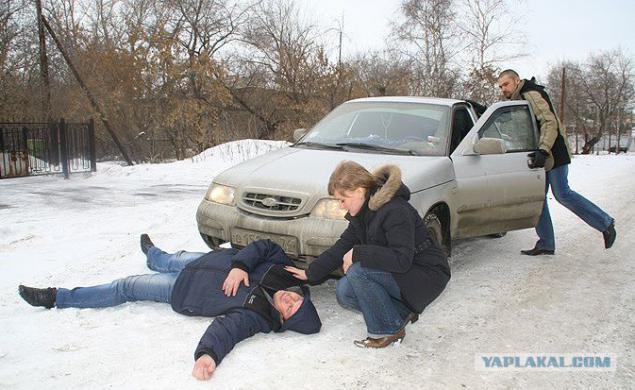
Every decent person, through the fault of someone else who broke an expensive thing, it will offer the owner to repair the damage. Such honesty is often used by fraudsters who can tune such as "random" encounter on the street or in a store.
Such scams are very common in the land of the rising sun during the crazy high prices of fruit and, in particular - melons. Attackers with melons in his hands deliberately crashed into tourist and dropped his burden, demanded compensation. As a general rule, travelers prefer to pay to quickly hush up the conflict.
Of course, by "falling melon" speculators are in our time, but instead they drop their fruit household appliances (which most likely was broken long before the fall) or the box with "doroguschy vases" (ie broken glass), they said , "bought as a gift to his wife" (as an option - the mother-in). The most careful and experienced from scam even acquire fake checks that placing in evidence the value of "spoiled things».

2. "godsend»
You may have encountered a similar scam, if not your imagination: you on the street asked a complete stranger, who claims to have found a wallet with a large sum of money and does not know how to handle them. During discussion of the situation your partner or you voiced the idea that the funds should be divided. The scammer calls his "lawyer" who "advises" you to take money on deposit, prepositions can be different, "better to wait, do not show up if the owner of the purse," or something like that. Rogues ask you to leave them a smaller amount as a guarantee for the future receipt of the findings, you amenable to persuasion, since even imagine how much you can buy in the "fallen from the sky" state. Further developments is not difficult to predict - looking into the wallet, you find there "jokes tickets bank" or a pack printed on the printer, "notes».
There are different variations of this scam, but somehow, the attackers "a large amount of trust," or "valuable thing" only in exchange for a pledge. Be careful - if a stranger agrees to give you a lot of money at much lower collateral, it is either an idiot or a follower of the great schemer.

3. "The Ring»
As a "gift of fate", this kind of scam is designed for an extremely greedy and pragmatic, or vice versa, unselfish and helpful people. Most often fraudsters operate as follows: on the street you meet a charming girl heartbroken that asks whether you are her golden wedding ring, lost somewhere nearby. After receiving a negative response, the beautiful promises a reward for the return of jewels and leave contact phone number to ring in case of you can contact her. After a while you "miraculously" encounter with a stranger who "just today" found a gold ring, "standing fabulous money" and of course, the finding was made precisely in the area where you applied "distraught bride».
Fool clear that the ring belongs to her and you decide to buy the ring to pass his "victim", leave yourself or to sell (the latter two options - for the most stale and heartless). To pay for a jewel tidy sum, you carry it to a jeweler and ask to assess a "good buy", and he said that this piece of copper is slightly less than nothing.
If you do not want to fall into such a binding, try to stay away from strangers, but eager rubbed your help, even if it is very nice, and in any case do not buy from passers jewelry and other things that look very valuable.

4. "Winning the lottery»
There is a huge number of varieties of this fraud, but the principle remains the same it - convince the victim to buy up "prize" at the dummy "lottery winners" who for some reason can not get the prize. When mobile phones were not common enough, fraudsters even produced false papers to "prove win" tables Ticket winners, but now the victim may at any time check the true price of a ticket, so the newspaper is no longer printed crooks, learning other ways to convince the client to part with money .
Sometimes the "winner" claims, for example, owes the bank a large sum of money, so certainly bailiffs confiscated his winnings. In other cases, the problem is the absence of registration or identity document - imagination is boundless intruders. "Luohu" offer to become the owner of the coveted tickets for the modest (compared to the "Prize") money, and when he comes for the "legitimate reward," I was surprised to realize that he gave for their money.

5. "The Spanish Prisoner»
"The Spanish Prisoner" - one of the oldest tricks fraudsters (similar to the case described in one of the books XVI-century, in honor of his trick it got its exotic name), but the narrow-minded and gullible townsfolk still come across it. The thing is - the scammer convinces "sucker" that he is a very senior and influential person (perhaps from another country) to be quietly get owned him money. From the victim requires a feasible material aid, instead of "American businessman" ("Arab Sheikh", "Nigerian prince" - a legend can be anything) promises considerable rewards and assures that any services will, of course, only after receiving the money. During the "rescue capital" having more and more difficulties that can be overcome only by infusion of additional funds from the victim's pocket -vymogatelstvo lasts as long as the client does not run out of money, or he did not suspect the deception.
Con artists of our time are often cautious and ingenuity of their colleagues, who lived centuries earlier. For example, a crook posing as assistant foreign diplomat or an industrialist, tells you what he wants to buy the extremely valuable goods lying in stock, but the entire amount is not on hand. You offer to invest their money, because the deal is very beneficial - the money spent will return tenfold. Then it turns out that to get the goods are not so simple - it is necessary to "give to the paw" officer or other officer so kindly to fork out again, and so on ... Do not hesitate to pay, because "profit with a vengeance cover all costs" - a joke Of course. These movers and shakers of the business will never be involved in major transactions outsiders, do not let the desire for freebies to take precedence over common sense.

6. "To you goes Auditor!»
You, as any reasonable person not going to anybody to report information on their bank accounts, however, fraudsters can fraudulently obtain access to your cash.
The most common scam crank their machinations via accomplice working at the bank. For example, you are told that the account is frozen for "verification details", because of "suspicion of his fictitious" or for any other reason (most importantly, that she was more convincing as possible), and while you're trying to figure out what's what, fraudsters deposit money into your account and cover their tracks illegal operations. Crooks use a very different circuit, so if you thought that a bank employee fool you, immediately ask for a meeting with his boss - it will help to clarify the situation, of course, if the top managers in the share.

7. "Overpayment»
For cheaters shortcomings of the banking system and "hole" in the legislation - that still loyal associates. Rogues have long used such tricks as the opening of fictitious accounts and fake bank checks, among the most popular types of such scams - writing a check for an amount exceeding the purchase price. When the seller discovers "overpayment" and tells of her attacker, who proposes to transfer the "extra money" to another account, or send cash to the specified address. When you try to cash a check unlucky victim discovers that account is closed or never existed.
One of the most famous artists in the world of banking fraud - American Frank Abagnale Jr. In the 1960s Frank cranked lot of illegal transactions worth more than $ 2, 5 million. His outstanding acting skills helped him for a long time hiding from the police, but in the end, Abagnale was caught and sentenced to 12 years in prison. He spent only a fraction of the period, and after his release from prison became a consultant to major corporations and governments around the world on issues of economic security. In 2002, he released the movie "Catch Me If You Can," which is based Abagnale's autobiography.

8. "Plumbing called?»
Speculators often disguised as employees of public utilities and government organizations, allowing you to quickly ingratiate himself to a potential victim. Under the pretext of checking counters or detection of illegal redevelopment fraudsters penetrate the housing and diverting the attention of the owner, take out household appliances and other valuables.
Fortunately, this species to resist cheating is quite easy - just call the management company. If current employees utilities do not know anything about the unscheduled visit to a plumber or an electrician, you can safely drive the intruders in the neck, but it is better to call the police and pretending that nothing is suspect, to play for time before the arrival of the valiant security forces to take attackers in the act.

9. "Spot on tie»
Many of the tricks scammers are pretty simple, but no less effective. Let's say you go down the street and suddenly a stranger finds a spot on your tie (or other garment) and offers it to erase. And you do not have time to blink an eye as a "benefactor" to remove the dirt, and with it - your wallet.
Most often thieves themselves discreetly applied stains on clothing to offer assistance to look convincing. Usually, people get confused and start looking at their clothes, when someone tells them about the spot so the fraudsters operate very quickly and confidently. In such a situation, try not to come into close contact with a stranger, politely but firmly reject the offer of help and erase the stain yourself.

10. "settle the case on the ground»
For motorists, there is nothing worse than to knock down pedestrians: at best, will have to spend a lot of time and money on court proceedings, not to mention compensation and at worst there is the risk put behind bars. Wanting to avoid serious problems, many drivers prefer to settle disputes on the spot than skillfully use attackers who deliberately throw themselves under the wheels of the car, and then blackmailed the motorist to get him to cough up. I must say, this method of fraud requires a certain daring rogue, because in a collision there is always a risk of serious injury.
Recently gaining popularity safer for fraudsters kind of scam. It looks like this: after an accident "victim" states that feels good, but that's bad luck, his plate (as an option - a laptop or smartphone) smash hit bumper. Driver with joy ("pedestrian alive and apparently not eager to sue") offers to give "victims" amount, which will be enough to buy a new gadget. If a motorist is not in a hurry to get the money into the crowd of onlookers immediately is "well-wisher" (or "an angry witness"), which advises not to delay the payment, because "litigation will cost much more expensive." Needless to say that the "pedestrian" and "well-wisher" consist of collusion.
If you manage to knock down pedestrians, above all, call the police, ambulance and find independent witnesses of the incident - this will help avoid blackmail and bring crooks to clean water.
via
I personally have been here such a case, rather, might be:
In the video, I did ten years ago it was)))
And what events occurred to you?



